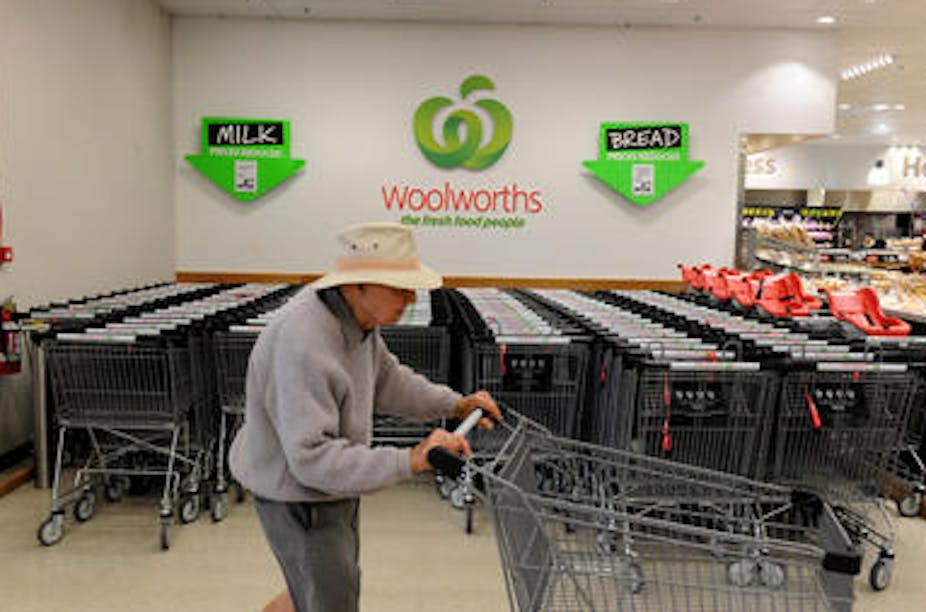In 1954, American consumer behaviour academic, Gregory Stone identified four different types of consumers.
Consisting of 150 in-depth interviews, Stone’s research found there was an “economic” shopper, who was after bargains, a “personalising” shopper, who liked interaction with staff, and an “apathetic” shopper, who was disillusioned and unengaged in shopping activity.
Then there was the “ethical” grocery shopper – consumers who demonstrated a moral obligation to patronise local merchants, purchase locally produced products and felt the need to “shop where they ought to”.
This ethical shopper was willing to sacrifice lower prices, convenience and range, in order to “help the little guys out”.
The idea of the ethical shopper has since taken hold in mainstream retailing.
But my new research has suggested that socially responsible consumption may be a thing of the past.

Four types of shopper
A study and analysis of 280 Australian grocery shoppers I have conducted has found there are essentially four types of modern shopper; “budget-conscious”, “controlled”, “busy” and “apathetic”.
Stone’s “ethical” shopper seems to have disappeared.
After an extensive review of the literature relating to shopping behaviour and important supermarket attributes, I constructed a 71 item questionnaire survey to collect data from supermarket shoppers.
Cluster analysis was undertaken in order to define homogeneous groups of shoppers. These cohorts of shopper were compared against previous studies.
Although the research detected behavioural consistencies between the identified groups of Australian shoppers and previous international research, it also revealed the disappearance of Stone’s “ethical” shopper.
I reviewed 21 shopper typology studies, across several retail channels, from the 1950s until 2003.
The “apathetic” shopper was present in many, presenting as someone disengaged and uninterested in shopping activity.

In contrast, the “controlled” shopper demonstrated a willingness to take the time to complete their grocery shopping in a methodical and planned manner.
The “busy” shopper completed their shopping at the fastest rate and paid the highest amount per item, which correlated to their avoidance of price checking.
The largest group, the “budget-conscious” shopper, was also strongly represented in other studies.
This shopper compared prices of products and visited other supermarkets in order to save money. They purchased lower quality, generic brands to reduce expenditure.
What was missing was ethical and socially responsible shopping behaviour in the supermarket.
Milk wars
So what does this mean for retailers – and consumers? The widely reported great supermarket price war all began when Coles brandished their home-brand milk at $1 per litre.
Since then, Coles and Woolworths have been trying to outdo one another with substantial and permanent price reductions.
Such action has lead to significant debate (and a Senate inquiry) surrounding the sustainability of such price discounting, the impact on small retailers, market dominance and consumer choice.
Both retailers have argued that we live in a market-driven economy and supermarkets are giving their customers what they want – lower-priced groceries.
Consumer groups have welcomed the discounting, suggesting that price reductions, leading to lower food expenditure, is a good thing for Australian consumers who are finding it difficult to make ends meet each week.
In contrast, primary industries groups, brand manufacturers and smaller retailers have proffered such long-term, continued price discounting will lead to farmers leaving the land, less product choice and the demise of the local grocer.
What consumers want
So, while Coles keeps “driving prices down” and Woolworths continues to “knock prices down” are they really giving Australian consumers what they want?
Well, yes they are. Shoppers want cheap milk, bread, eggs (and items such as lamb) and that’s what they’ll get.
The research suggests that the majority of grocery shoppers today rarely consider social responsibility when purchasing grocery products or when selecting supermarkets.
When given the choice of a two litres of supermarket homebrand priced at $2 compared to two litres of Maleny Dairy Farms milk at $4.29, it seems most shoppers will purchase the cheaper product.
This is of course what our major supermarkets are banking on.
But maybe it is time to look at the supermarket price wars a different way.
As consumers, we demand lower prices, discounts, specials, convenient trading times, fast service, car parking, and air conditioned comfort.
But with that comes consequences.

Lower prices, fewer choices
Yes, it can mean lower food prices and some increased competition between the two (or three) main players.
But it also possibly leads to fewer product choices for consumers. Yet shoppers appear to be happy to accept these conditions.
In a retailing context, ethical behaviour requires the shopper to behave in accordance with carefully thought out rules of moral philosophy – rules relating to right and wrong.
In other words, we know it is “right” to pay for our milk when we reach the registers.
Social responsibility, in the same context, focuses on the effects of shoppers’ actions.
This is simply, “I’ll buy the more expensive milk because I am supporting my local community, local farmers, local economy”.
There has been much interest in ethical and socially responsible consumption in recent years.
Studies that have considered ethical consumption have examined fair trading, organic products, free-range products, farmers markets and “freedom” foods.
The supermarkets have responded accordingly, with both claiming to support Australian farmers and local producers. (Remember the commercials of the Woolworths beef-buyer standing in the stock yards with an Akubra?)
Disappointingly, research that has attempted to examine ethical and socially responsible shopping behaviour in the supermarket has sampled only consumers who claim to be “socially responsible”.
Arguably, more research is required to identify what proportions of us are willing to forsake lower prices and convenience to be considered “socially responsible” shoppers.
In the meantime, does Stone’s “ethical” shopper still wander the aisles of our major supermarkets each week? I suspect not.

